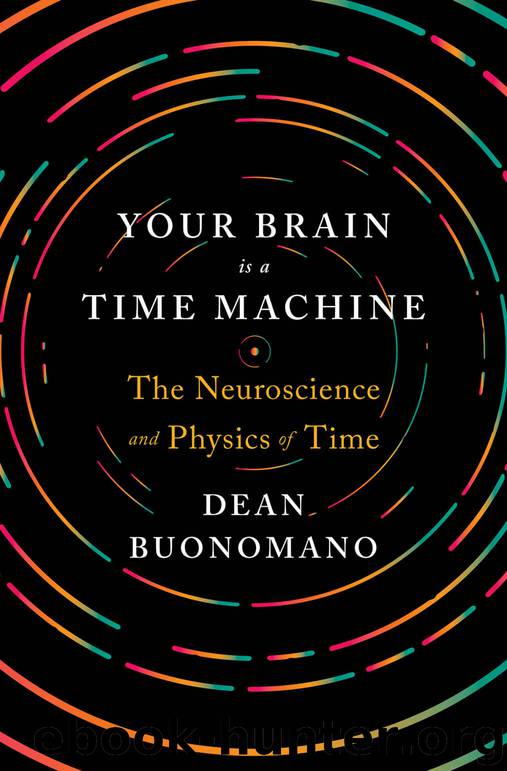Your Brain Is a Time Machine: The Neuroscience and Physics of Time by Dean Buonomano

Author:Dean Buonomano [Buonomano, Dean]
Language: eng
Format: azw3
Publisher: W. W. Norton & Company
Published: 2017-04-04T04:00:00+00:00
9:00: THE SPATIALIZATION OF TIME IN PHYSICS
For us believing physicists, the division into past, present and future has merely the meaning of an albeit obstinate illusion.
—ALBERT EINSTEIN1
One thing that makes basketball so exciting is that the outcome of the game can come down to a race against the clock. The player taking the last shot must release the ball before the clock ticks down to zero and the buzzer sounds. If the ball leaves the hand before the game clock hits zero the shot counts. It would seem that determining which of these two events took place first would be an entirely objective endeavor: the ball either left the player’s hand before the clock ticked down or it didn’t. It turns out, however, that this is not the case.
As a thought experiment let’s suppose that a referee determines that a game-winning shot taken at one end of the court did indeed leave the hand of a player before an atomic clock at the other end of the court counted down to zero. Using some high-tech equipment the referee later confirms that there was a full nanosecond (a billionth of a second) left on the clock when the ball was released. Now let’s also suppose that because this was game seven of the NBA finals, an astronaut was watching the game through a telescope while on an absurdly fast spaceship traveling half the speed of light.2 Upon learning that the shot was valid, the astronaut finds himself slandering the ref’s dear mother, because the astronaut determined that the clock ticked down all the way to zero before the ball was released—and thus the basket should not count. These diverging reports of whether the basket counted and which team was the rightful champ have nothing to do with the delays associated with the amount of time it takes information to travel to the spaceship—we are assuming all parties took those delays into account. The two narratives are simply two equally valid realities, one in which the victorious team deserved to win and another in which the referee gave the game away.
How can this be? Is it possible that two events could occur in one order for one observer, and in a different order for another? If so, what would that say about the nature of time? To answer these questions we must delve into Einstein’s theory of special relativity.
Download
This site does not store any files on its server. We only index and link to content provided by other sites. Please contact the content providers to delete copyright contents if any and email us, we'll remove relevant links or contents immediately.
The Complete Stick Figure Physics Tutorials by Allen Sarah(7363)
Secrets of Antigravity Propulsion: Tesla, UFOs, and Classified Aerospace Technology by Ph.D. Paul A. Laviolette(5365)
Thing Explainer by Randall Munroe(3930)
The River of Consciousness by Oliver Sacks(3599)
The Order of Time by Carlo Rovelli(3188)
How To by Randall Munroe(3105)
A Brief History of Time by Stephen Hawking(3022)
I Live in the Future & Here's How It Works by Nick Bilton(2993)
What If?: Serious Scientific Answers to Absurd Hypothetical Questions by Randall Munroe(2700)
The Great Unknown by Marcus du Sautoy(2690)
Midnight in Chernobyl by Adam Higginbotham(2541)
Blockchain: Ultimate Step By Step Guide To Understanding Blockchain Technology, Bitcoin Creation, and the future of Money (Novice to Expert) by Keizer Söze(2483)
Networks: An Introduction by Newman Mark(2404)
The Meaning of it All by Richard Feynman(2349)
Easy Electronics by Charles Platt(2325)
The Tao of Physics by Fritjof Capra(2272)
Midnight in Chernobyl: The Untold Story of the World's Greatest Nuclear Disaster by Adam Higginbotham(2220)
Introducing Relativity by Bruce Bassett(2115)
When by Daniel H Pink(2113)
